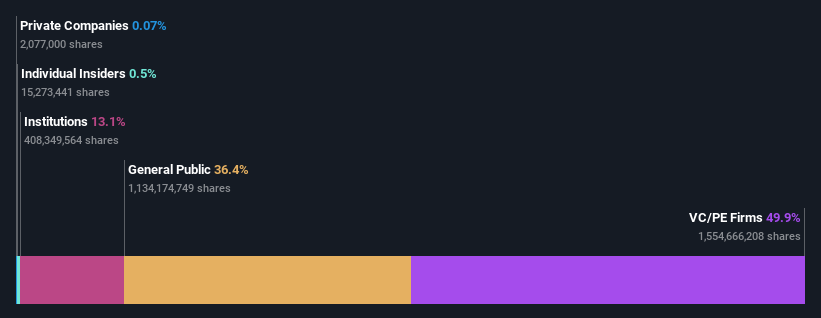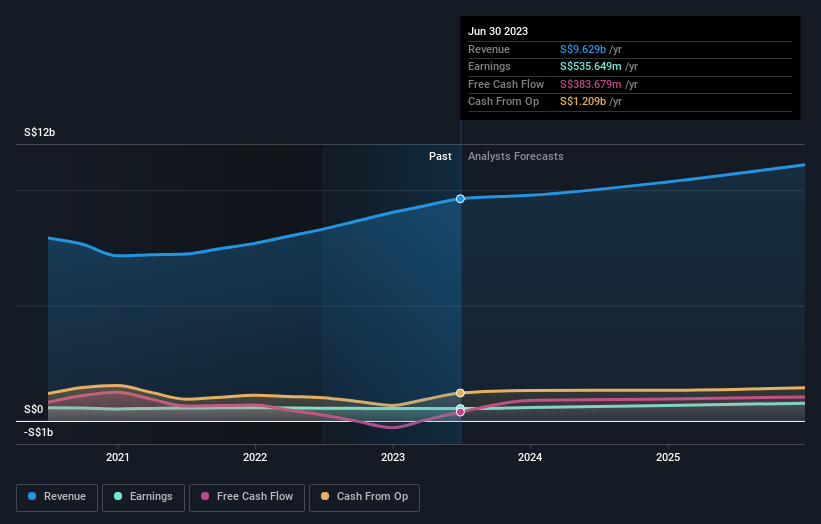Individual investors own 36% of Singapore Technologies Engineering Ltd (SGX:S63) shares but private equity firms control 50% of the company
Key Insights
The considerable ownership by private equity firms in Singapore Technologies Engineering indicates that they collectively have a greater say in management and business strategy
The top 2 shareholders own 52% of the company
Institutional ownership in Singapore Technologies Engineering is 13%
If you want to know who really controls Singapore Technologies Engineering Ltd (SGX:S63), then you'll have to look at the makeup of its share registry. The group holding the most number of shares in the company, around 50% to be precise, is private equity firms. That is, the group stands to benefit the most if the stock rises (or lose the most if there is a downturn).
Individual investors, on the other hand, account for 36% of the company's stockholders.
In the chart below, we zoom in on the different ownership groups of Singapore Technologies Engineering.
View our latest analysis for Singapore Technologies Engineering
What Does The Institutional Ownership Tell Us About Singapore Technologies Engineering?
Institutions typically measure themselves against a benchmark when reporting to their own investors, so they often become more enthusiastic about a stock once it's included in a major index. We would expect most companies to have some institutions on the register, especially if they are growing.
Singapore Technologies Engineering already has institutions on the share registry. Indeed, they own a respectable stake in the company. This suggests some credibility amongst professional investors. But we can't rely on that fact alone since institutions make bad investments sometimes, just like everyone does. It is not uncommon to see a big share price drop if two large institutional investors try to sell out of a stock at the same time. So it is worth checking the past earnings trajectory of Singapore Technologies Engineering, (below). Of course, keep in mind that there are other factors to consider, too.
We note that hedge funds don't have a meaningful investment in Singapore Technologies Engineering. Looking at our data, we can see that the largest shareholder is Temasek Holdings (Private) Limited with 50% of shares outstanding. With 1.8% and 1.8% of the shares outstanding respectively, The Vanguard Group, Inc. and BlackRock, Inc. are the second and third largest shareholders.
To make our study more interesting, we found that the top 2 shareholders have a majority ownership in the company, meaning that they are powerful enough to influence the decisions of the company.
Researching institutional ownership is a good way to gauge and filter a stock's expected performance. The same can be achieved by studying analyst sentiments. Quite a few analysts cover the stock, so you could look into forecast growth quite easily.
Insider Ownership Of Singapore Technologies Engineering
The definition of company insiders can be subjective and does vary between jurisdictions. Our data reflects individual insiders, capturing board members at the very least. The company management answer to the board and the latter should represent the interests of shareholders. Notably, sometimes top-level managers are on the board themselves.
Most consider insider ownership a positive because it can indicate the board is well aligned with other shareholders. However, on some occasions too much power is concentrated within this group.
Our data suggests that insiders own under 1% of Singapore Technologies Engineering Ltd in their own names. As it is a large company, we'd only expect insiders to own a small percentage of it. But it's worth noting that they own S$57m worth of shares. In this sort of situation, it can be more interesting to see if those insiders have been buying or selling.
General Public Ownership
The general public, who are usually individual investors, hold a 36% stake in Singapore Technologies Engineering. This size of ownership, while considerable, may not be enough to change company policy if the decision is not in sync with other large shareholders.
Private Equity Ownership
With a stake of 50%, private equity firms could influence the Singapore Technologies Engineering board. Some investors might be encouraged by this, since private equity are sometimes able to encourage strategies that help the market see the value in the company. Alternatively, those holders might be exiting the investment after taking it public.
Next Steps:
It's always worth thinking about the different groups who own shares in a company. But to understand Singapore Technologies Engineering better, we need to consider many other factors. For example, we've discovered 2 warning signs for Singapore Technologies Engineering that you should be aware of before investing here.
If you would prefer discover what analysts are predicting in terms of future growth, do not miss this free report on analyst forecasts.
NB: Figures in this article are calculated using data from the last twelve months, which refer to the 12-month period ending on the last date of the month the financial statement is dated. This may not be consistent with full year annual report figures.
Have feedback on this article? Concerned about the content? Get in touch with us directly. Alternatively, email editorial-team (at) simplywallst.com.
This article by Simply Wall St is general in nature. We provide commentary based on historical data and analyst forecasts only using an unbiased methodology and our articles are not intended to be financial advice. It does not constitute a recommendation to buy or sell any stock, and does not take account of your objectives, or your financial situation. We aim to bring you long-term focused analysis driven by fundamental data. Note that our analysis may not factor in the latest price-sensitive company announcements or qualitative material. Simply Wall St has no position in any stocks mentioned.

 Yahoo Finance
Yahoo Finance 

